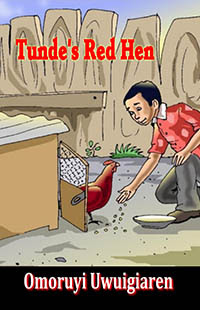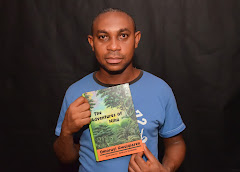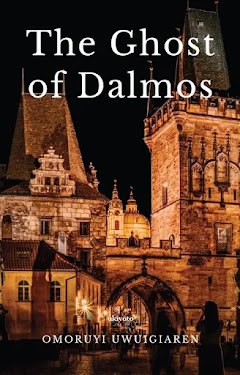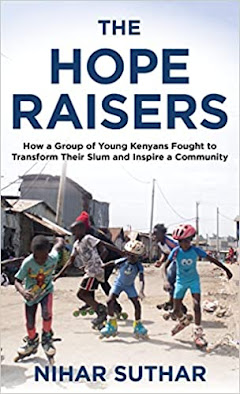 |
| Picture of the boy and his mother at a tender age |
Samuel has no recollection of the
day he was abducted, aged seven, from his family home in the northern Nigerian
city of Kano. Although he came from a large family - his father had 17 children
by four wives - Samuel was on his own with a nanny that day. His family was
told he had gone outside to ride his bicycle. They would not see him again for
another six years.
The Search
"There is nothing we didn't do to try to find him," his older sister Firdausi Okezie recalls. Then aged 21, she was not made aware of his disappearance at first. Her brother had always enjoyed rushing to answer the phone and speak with her when she called home from university. But when other members of the household began answering it when she rang, she suspected something was wrong. After her classes one afternoon, Firdausi travelled home unexpectedly and her father, an architect and hotelier, was forced to reveal the heart-breaking truth: Her favourite sibling had been missing for more than a month. At first, my father had the nanny arrested, but after investigations, they let her go," Firdausi says.
They also tried to hide the news from Samuel's mother, who was divorced from his father, for as long as possible. Every time she called from her new home in a different city, they would conjure different excuses. Eventually, an uncle was assigned the unenviable task of telling her. In addition to extensive police investigations, the family placed adverts in newspapers and sent out search parties to comb the streets.
They checked ditches in case he had
been the victim of a hit and run, and even consulted Muslim spiritual priests,
known as “malams”.
In time, her father asked the family to accept that their brother was dead - they had done the best they could.
In time, her father asked the family to accept that their brother was dead - they had done the best they could.
The Scream
Firdausi refused to give up. She dedicated her university thesis to her missing brother and a year after graduating, she moved south to Lagos in search of work. She converted to Christianity and started attending Winners Chapel - one of Nigeria's mega churches based in Ogun state just outside the city. Every December, the church holds a five-day gathering of its members from all over the world. During the event, known as Shiloh, interested members of the congregation are allocated free stands to display their goods and services within the church premises. Still without a job in December 2000, Firdausi applied for a stand to sell some tie-dye fabrics her mother had made.
While waiting for a carpenter to help set up the display, she sat on a chair and placed her head in her lap for some rest. That was when she heard a beggar appealing, in the name of Allah, for spare change. Firdausi looked up. This beggar had his hand firmly planted on the left shoulder of a boy who was dressed in a tattered brown tunic and undersized trousers. Firdausi screamed—the haggard boy guiding the beggar was her lost brother.
The kidnap
Samuel, now aged 13, cannot recall exactly how he was stolen from his family: "All I remember is the train journey."
He was taken to a one-armed woman
who lived on the outskirts of Lagos in an area mostly occupied by disabled
beggars. The woman hired him out to blind beggars for 500 naira (approximately
$5 or £2.50 at the time) per day. The sight of blind men and women being led
around by boys and girls is common on many streets in Nigeria - especially in
dense traffic where they usually tap on car windows, or around churches and
mosques. Only Samuel lived with the woman, sleeping on a mat in her shack. Over
the years, he says about five others boys turned up to live with other women in
the same yard, each hired out to blind beggars.
Samuel suspects that something must have been done or given to him during that time because he does not recall ever thinking of his family during that period, or wondering what had become of them.
"I am not sure I had emotions then," he says. "Just a zombie that knew he had to wake up and lead a beggar out. Make money; eat food and sleep, and the same routine the next day.”
He lived like a slave. Different beggars hired him for a period of anything from a week to a month. At the end of each day, Samuel and the beggar slept alongside others in various public spaces. If a beggar enjoyed working with him, they hired him again for another period.
Samuel suspects that something must have been done or given to him during that time because he does not recall ever thinking of his family during that period, or wondering what had become of them.
"I am not sure I had emotions then," he says. "Just a zombie that knew he had to wake up and lead a beggar out. Make money; eat food and sleep, and the same routine the next day.”
He lived like a slave. Different beggars hired him for a period of anything from a week to a month. At the end of each day, Samuel and the beggar slept alongside others in various public spaces. If a beggar enjoyed working with him, they hired him again for another period.
"I was like a slave," he
says. "I couldn't say I wanted to go and do anything. I had to be around
always." As he was always on the move, Samuel made few friends, only
occasionally playing with the children of other beggars he bumped into in the
evenings. Sometimes people gave them food while they were out begging. At other
times they hung around restaurants and ate the leftovers or scavenged in
dustbins.
"I was always hungry. During
the daytime when you work, you hardly sit down to eat," he recalls.
"I didn't feel the beggars were bad. They wake up, beg, the way people wake up and go to work."
Day after day, Samuel walked from one end of Lagos to the other with a beggar's right hand gripping his shoulder. Sometimes, they trekked to neighboring states or across the border to Benin. If the beggars received news of potential benefactors gathered somewhere, they told Samuel and he took them there by bus.
"There were times when you get so tired and you start bypassing people, but blind people are very sensitive - their hearing - so they pick up sound. Sometimes they would twist your shoulder and say: 'There is someone there. Why are you moving away?'
"They try to make as much money as they can.
"I didn't feel the beggars were bad. They wake up, beg, the way people wake up and go to work."
Day after day, Samuel walked from one end of Lagos to the other with a beggar's right hand gripping his shoulder. Sometimes, they trekked to neighboring states or across the border to Benin. If the beggars received news of potential benefactors gathered somewhere, they told Samuel and he took them there by bus.
"There were times when you get so tired and you start bypassing people, but blind people are very sensitive - their hearing - so they pick up sound. Sometimes they would twist your shoulder and say: 'There is someone there. Why are you moving away?'
"They try to make as much money as they can.
The Miracle
In December 2000, a beggar he was guiding heard news of the programme at Winners Chapel where they ran into his sister. At first, Firdausi was too shocked to reach out and touch her brother - who can still recall her scream. "I fell down on the floor," she says.
Samuel looked gaunt, his right shoulder was significantly tilted and he appeared dumb, not speaking a word. The sight caused Firdausi to burst into tears.
In December 2000, a beggar he was guiding heard news of the programme at Winners Chapel where they ran into his sister. At first, Firdausi was too shocked to reach out and touch her brother - who can still recall her scream. "I fell down on the floor," she says.
Samuel looked gaunt, his right shoulder was significantly tilted and he appeared dumb, not speaking a word. The sight caused Firdausi to burst into tears.
"It took a while but I knew
that she was someone I knew - that this person was someone related to me,"
Samuel says.
Soon a crowd gathered and drawn by the commotion, church officials also arrived. They managed to make sense of Firdausi's barely coherent joy and decreed that it was a "miracle" worth sharing with the entire congregation. They ferried Samuel to a corner and gave him a quick wash. They found him fresh clothes to wear and rushed them both to the stage of the 50,000-seat auditorium where Firdausi was given a microphone. In tears, she narrated how she had just found her brother who had been missing for six years. Firdausi recalls how the entire congregation leapt out of their chairs in shouts of praise and thanksgiving.
--BBC Africa. Written by Adaobi Tricia Nwaubani
Soon a crowd gathered and drawn by the commotion, church officials also arrived. They managed to make sense of Firdausi's barely coherent joy and decreed that it was a "miracle" worth sharing with the entire congregation. They ferried Samuel to a corner and gave him a quick wash. They found him fresh clothes to wear and rushed them both to the stage of the 50,000-seat auditorium where Firdausi was given a microphone. In tears, she narrated how she had just found her brother who had been missing for six years. Firdausi recalls how the entire congregation leapt out of their chairs in shouts of praise and thanksgiving.
--BBC Africa. Written by Adaobi Tricia Nwaubani



















































.jpg)

































































